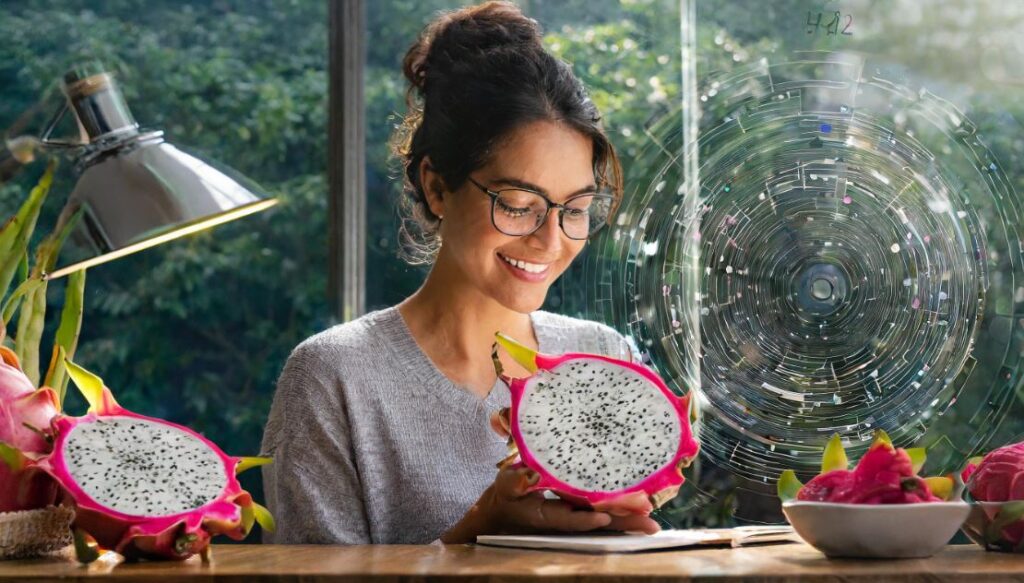Introduction: In the fast-paced world we live in, maintaining good health is essential, and our eyesight plays a crucial role in our daily lives. In a world where screens dominate our daily lives, the health of our eyes has become more crucial than ever.
With concerns about digital eye strain and age-related vision issues on the rise, it’s essential to explore natural ways to support our ocular health.
In this blog, we’ll explore dragon fruit benefits for eyes and the role of dragon fruit in promoting and sustaining good eye health.
Contents
- 1 The Eye-Boosting Nutrients in Dragon Fruit:
- 2 Important Notes:
- 3 Conclusion:
- 4 FAQs
- 4.0.1 Is there scientific research supporting the link between dragon fruit consumption and eye health?
- 4.0.2 Can dragon fruit help prevent night blindness?
- 4.0.3 Can dragon fruit help reduce the risk of cataracts?
- 4.0.4 Are there any potential side effects of consuming dragon fruit for eye health?
- 4.0.5 Is dragon fruit really beneficial for eye health, or is it just a marketing hype?
- 4.0.6 Can dragon fruit help prevent age-related macular degeneration (AMD)?
- 4.0.7 How can I incorporate dragon fruit into my diet to reap its eye health benefits?
- 4.0.8 Can children benefit from consuming dragon fruit for eye health?
- 4.0.9 How can I incorporate dragon fruit into my diet for eye health?
- 4.0.10 Is there a specific variety of dragon fruit that is more beneficial for eye health?
The Eye-Boosting Nutrients in Dragon Fruit:

Dragon fruit, also known as pitaya, is not only visually appealing but is also a nutritional powerhouse. Packed with essential vitamins, minerals, and antioxidants, this tropical fruit contributes significantly to overall eye health. Here are some key nutrients found in dragon fruit that are essential for our healthy eyes:
1. Rich in Antioxidants:
Dragon fruit is a great source of vitamin C, which is essential for maintaining the health of blood vessels in the eyes. This vitamin also supports the collagen structure of the cornea and may reduce the risk of cataracts.
Dragon fruit contains a small amount of beta-carotene and beta-cryptoxanthin which help protect the eyes from oxidative stress caused by free radicals. These antioxidants neutralize harmful molecules, reducing the risk of age-related macular degeneration (AMD) and cataracts.

2. Vitamin A Content:
Dragon fruit is a good source of vitamin A which is crucial for good vision, particularly in low-light conditions. Vitamin A supports the proper functioning of the retina and helps prevent night blindness and other vision problems.
3. Lutein and Zeaxanthin:
These two carotenoids are crucial for eye health as they are known to accumulate in the retina.

- Protecting your eyes: Lutein and zeaxanthin act like natural sunglasses for your eyes, shielding them from harmful ultraviolet (UV) rays that can damage your retina filtering out harmful blue light, and protecting them from damage caused by the sun. This is especially important for preventing age-related macular degeneration (AMD) and cataracts, which are common eye problems that can cause vision loss.
- Boosting your vision: These nutrients help improve your visual acuity and contrast sensitivity, especially in low-light conditions which helps you see better. They also improve your ability to distinguish colors and fine details.
- Reducing eye strain: Spending too much time looking at screens can cause eye strain. Lutein and Zeaxanthin can help reduce eye fatigue and discomfort, making it easier for you to focus on your tasks
- Reducing inflammation: Lutein and zeaxanthin have anti-inflammatory properties, which may help protect your eyes from various inflammatory diseases.
4. Hydration:
Proper hydration is essential for maintaining the moisture balance in the eyes and preventing dryness, irritation, and discomfort. Dragon fruit has a high water content, making it a hydrating snack that contributes to overall eye comfort.
5. Anti-inflammatory Properties:
Chronic inflammation can contribute to various eye conditions, including dry eye syndrome and glaucoma. Dragon fruit contains anti-inflammatory compounds that may help reduce inflammation and promote eye health.

6. Fiber content:
Dragon fruit’s high fiber content can help regulate blood sugar, which may indirectly improve blood flow to the eyes and overall eye health.
7. Blood Sugar Regulation:
High blood sugar levels can damage the blood vessels in the eyes, leading to diabetic retinopathy and other complications. Dragon fruit has a low glycemic index and may help regulate blood sugar levels, potentially reducing the risk of diabetic eye diseases.
Important Notes:
- More research is needed: While some studies suggest potential benefits, more research is needed to confirm the effectiveness of dragon fruit specifically for eye health.
- Not a substitute for medical advice: If you have any concerns about your eye health, consult an eye doctor. They can provide personalized advice based on your individual needs.
- Not a cure-all: Dragon fruit should not be considered a replacement for a balanced diet or recommended treatments for eye conditions.
- Individual differences: The impact of dragon fruit on your eyes may vary depending on your overall diet, health status, and individual needs.
Conclusion:

Incorporating dragon fruit into your diet can be a delicious way to support your eye health naturally. Whether enjoyed on its own, added to smoothies, or mixed into fruit salads, this exotic fruit offers a plethora of benefits for your eyes. From antioxidant protection to hydration and inflammation reduction, dragon fruit provides valuable nutrients that contribute to maintaining clear vision and preventing eye-related issues. So, the next time you’re looking for a healthy snack option, reach for the vibrant hues of dragon fruit and treat your eyes to a burst of nutritional goodness.
Remember, while dragon fruit can be a beneficial addition to a balanced diet, it’s essential to prioritize overall wellness, including regular eye exams and proper eye care practices. By adopting a holistic approach to eye health, you can enjoy the world’s beauty with clarity and comfort for years to come.

FAQs
Is there scientific research supporting the link between dragon fruit consumption and eye health?
Several studies have investigated the beneficial effects of the individual nutrients found in dragon fruit, such as vitamin A, vitamin C, antioxidants, and carotenoids, on various aspects of eye health. These studies provide a scientific basis for the potential benefits of incorporating dragon fruit into a diet focused on supporting healthy eyes.
More research is needed specifically on the effects of dragon fruit consumption on eye health.
Can dragon fruit help prevent night blindness?
Yes, dragon fruit’s high vitamin A content is beneficial for preventing night blindness and supporting overall vision health. Vitamin A is crucial for the function of the retina, and its deficiency can lead to night blindness and other vision issues.
Can dragon fruit help reduce the risk of cataracts?
Yes, the vitamin C content in dragon fruit contributes to the maintenance of the collagen structure in the cornea, which may help reduce the risk of cataracts. Additionally, the overall antioxidant content of dragon fruit helps protect the eyes from oxidative damage that could contribute to the development of cataracts.
Are there any potential side effects of consuming dragon fruit for eye health?
Dragon fruit is generally safe for consumption, and it has no significant side effects on your eyes. However, individuals with allergies to certain fruits should exercise caution. It is advisable to consult with your doctor or a healthcare professional if you have specific concerns or pre-existing medical conditions.
Is dragon fruit really beneficial for eye health, or is it just a marketing hype?
Dragon fruit is indeed beneficial for eye health due to its rich content of essential nutrients like vitamin A, vitamin C, antioxidants, and carotenoids such as lutein and zeaxanthin. These nutrients play crucial roles in supporting various aspects of eye health, including vision, protection against oxidative stress, and prevention of age-related eye conditions.
Dragon fruit contains antioxidants like betalains and flavonoids, which help combat oxidative stress and protect the eyes from free radicals that contribute to age-related macular degeneration (AMD). Additionally, the presence of lutein and zeaxanthin in dragon fruit may further support eye health by accumulating in the retina and acting as natural sunblock against harmful light waves.
How can I incorporate dragon fruit into my diet to reap its eye health benefits?
Dragon fruit can be enjoyed in various ways, such as fresh fruit salads, smoothie bowls, or as part of a salsa. You can also simply slice it and eat it on its own. The key is to include dragon fruit regularly in your diet to ensure you receive its eye-boosting nutrients.
Can children benefit from consuming dragon fruit for eye health?
Yes, children can benefit from consuming dragon fruit as part of a balanced diet aimed at supporting overall health, including eye health.
However, it’s essential to introduce new foods gradually and ensure they are age-appropriate to minimize any potential choking hazards.
How can I incorporate dragon fruit into my diet for eye health?
There are several delicious ways to include dragon fruit in your diet. You can enjoy it in a fresh fruit salad, blend it into a smoothie bowl with yogurt and berries, or create a unique dragon fruit salsa with tomatoes, onions, cilantro, and lime juice. These options not only enhance the flavor but also provide a creative and nutritious approach to incorporating dragon fruit into your meals.
Is there a specific variety of dragon fruit that is more beneficial for eye health?
Both the red-fleshed and white-fleshed varieties of dragon fruit offer similar nutritional benefits. The key is to choose ripe fruit with vibrant colors, as the intensity of color is often an indicator of the presence of beneficial antioxidants.








